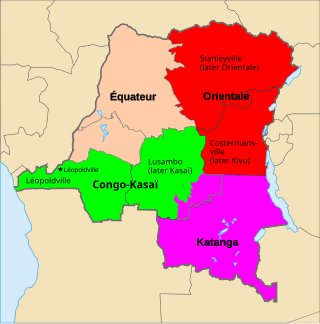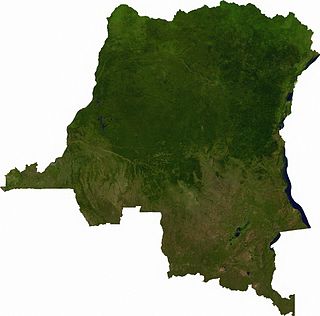This article needs additional citations for verification .(November 2024) |
A partial List of Democratic Republic of the Congo films follows:
This article needs additional citations for verification .(November 2024) |
A partial List of Democratic Republic of the Congo films follows:

Congo may refer to:
Democrat, Democrats, or Democratic may refer to:

Katanga was one of the four large provinces created in the Belgian Congo in 1914. It was one of the eleven provinces of the Democratic Republic of the Congo between 1966 and 2015, when it was split into the Tanganyika, Haut-Lomami, Lualaba, and Haut-Katanga provinces. Between 1971 and 1997, its official name was Shaba Province.

Kinshasa, formerly named Léopoldville until 30 June 1966, is the capital and largest city of the Democratic Republic of the Congo. Once a site of fishing and trading villages along the Congo River, Kinshasa is now one of the world's fastest-growing megacities. Kinshasa's 2024 population was estimated at 17,032,322. It is the most densely populated city in the DRC, the most populous city in Africa, the world's fourth-most-populous capital city, Africa's third-largest metropolitan area, and the leading economic, political, and cultural center of the DRC. Kinshasa houses several industries, including manufacturing, telecommunications, banking, and entertainment. The city also hosts some of DRC's significant institutional buildings, such as the Palais du Peuple, Palais de la Nation, Court of Cassation, Constitutional Court, Cité de l'Union Africaine, Palais de Marbre, Stade des Martyrs, Immeuble du Gouvernement, Kinshasa Financial Center, and multiple federal departments and agencies.

DR Congo, officially the Democratic Republic of the Congo, also known as the DRC, Congo-Kinshasa or simply Congo, is a country in Central Africa. By land area the Congo is the second-largest country in Africa and the 11th-largest in the world. With a population of around 109 million, the Democratic Republic of the Congo is the most populous Francophone country in the world. The national capital and largest city is Kinshasa, which is also the economic center. The country is bordered by the Republic of the Congo, Central African Republic, South Sudan, Uganda, Rwanda, Burundi, Tanzania, Zambia, Angola, the Cabinda exclave of Angola, and the South Atlantic Ocean.

The president of the Democratic Republic of the Congo is the head of state of the Democratic Republic of the Congo and commander-in-chief of the armed forces.

The national flag of the Democratic Republic of the Congo is a sky blue flag, adorned with a yellow star in the upper left canton and cut diagonally by a red stripe with a yellow fimbriation. It was adopted on 18 February 2006. A new constitution, ratified in December 2005 and which came into effect in February 2006, promoted a return to a flag similar to that flown between 1966 and 1971, with a change from a royal blue to sky blue background. Blue represents peace. Red stands for "the blood of the country's martyrs", yellow the country's wealth; and the star symbol the future for the country. It is one of the few national flags incorporating a diagonal line, with other examples including Tanzania, Namibia, Trinidad and Tobago, Saint Kitts and Nevis, and Brunei.
Katanga may refer to:

Article 2 of the Constitution of the Democratic Republic of the Congo divides the country into the capital city of Kinshasa and 25 named provinces. It also gives the capital the status of a province. Therefore, in many contexts Kinshasa is regarded as the 26th province.

Articles related to the Democratic Republic of the Congo include:

The Prime Minister of the Democratic Republic of the Congo is the head of government of the Democratic Republic of the Congo. The Constitution of the Third Republic grants the Prime Minister a significant amount of power.

The Republic of the Congo was a sovereign state in Central Africa, created with the independence of the Belgian Congo in 1960. From 1960 to 1966, the country was also known as Congo-Léopoldville to distinguish it from its northwestern neighbor, which is also called the Republic of the Congo, alternatively known as "Congo-Brazzaville". In 1964, the state's official name was changed to the Democratic Republic of the Congo, but the two countries continued to be distinguished by their capitals; with the renaming of Léopoldville as Kinshasa in 1966, it became also known as Congo-Kinshasa. After Joseph Désiré Mobutu, commander-in-chief of the national army, seized control of the government in 1965, the Democratic Republic of the Congo became the Republic of Zaire in 1971. It would again become the Democratic Republic of the Congo in 1997. The period between 1960 and 1964 is referred to as the First Congolese Republic.

The following outline is provided as an overview of and topical guide to the Democratic Republic of the Congo:

Radio Okapi is a radio network that operates in the Democratic Republic of the Congo. On an annual budget of USD$4.5 million, a staff of 200 provide news and information to the entire urban population of the DRC. Radio Okapi provides programming in French and in the four national languages of Congo: Lingala, Kituba, Swahili and Tshiluba,
The Budu people (Babudu) are a Bantu people living in the Wamba Territory in the Orientale Province of the Democratic Republic of the Congo. They speak the Budu language.
Cinema of the Democratic Republic of the Congo originated with educational and propaganda films during the colonial era of the Belgian Congo. Development of a local film industry after the Democratic Republic of the Congo gained its independence from Belgium in 1960, and was handicapped by constant civil war.